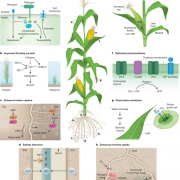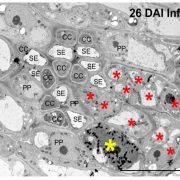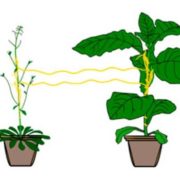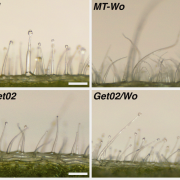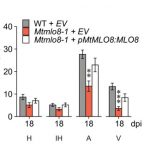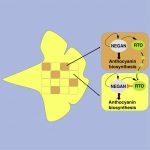Hybrid autoimmunity and a plant resistosome complex ($) (Cell Host Microbe)
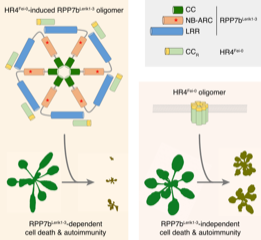 Hybrid necrosis occurs when the progeny of a cross between two different plants show widespread cell death. It can be caused by autoactivation of nucleotide-binding and leucine rich repeat domain (NLR) proteins, intracellular immune receptors that play a central role in plant resistance to diverse pathogens. Li et al. showed that hybrid necrosis in the cross between A. thaliana accessions Lerik1-3 and Fei-0 is caused when the NLR RPP7 from Lerik1-3 (RPP7b) and the non-NLR HR4 from Fei-0 (HR4Fei-0) are co-expressed in a single plant. They showed that HR4Fei-0 interacts with RPP7b and promotes RPP7b to form a higher-order complex in plants; this oligomerization and subsequent cell death activation require the P-loop and leucine-rich repeat (LRR) domain of RPP7b. Interestingly, HR4Fei-0 forms self-oligomers and triggers autoimmunity in plants in an RPP7b-independent manner. Also, HR4Fei-0, when expressed in bacteria, can kill bacterial cells in the absence of other plant NLRs. A mutant of HR4 compromised in self-oligomerization and RPP7b-independent cell death was also compromised in RPP7b-dependent cell death. Based on the results, the authors proposed a model in which HR4 oligomers, potentially mimicking HR4 targeted by pathogen effectors, act as ligands that activate RPP7b through promoting this NLR to form oligomers. This study demonstrates that hybrid necrosis can be used to mechanistically interrogate key components of the plant immune system. (Summary by Tatsuya Nobori) Cell Host Microbe 10.1016/j.chom.2020.01.012
Hybrid necrosis occurs when the progeny of a cross between two different plants show widespread cell death. It can be caused by autoactivation of nucleotide-binding and leucine rich repeat domain (NLR) proteins, intracellular immune receptors that play a central role in plant resistance to diverse pathogens. Li et al. showed that hybrid necrosis in the cross between A. thaliana accessions Lerik1-3 and Fei-0 is caused when the NLR RPP7 from Lerik1-3 (RPP7b) and the non-NLR HR4 from Fei-0 (HR4Fei-0) are co-expressed in a single plant. They showed that HR4Fei-0 interacts with RPP7b and promotes RPP7b to form a higher-order complex in plants; this oligomerization and subsequent cell death activation require the P-loop and leucine-rich repeat (LRR) domain of RPP7b. Interestingly, HR4Fei-0 forms self-oligomers and triggers autoimmunity in plants in an RPP7b-independent manner. Also, HR4Fei-0, when expressed in bacteria, can kill bacterial cells in the absence of other plant NLRs. A mutant of HR4 compromised in self-oligomerization and RPP7b-independent cell death was also compromised in RPP7b-dependent cell death. Based on the results, the authors proposed a model in which HR4 oligomers, potentially mimicking HR4 targeted by pathogen effectors, act as ligands that activate RPP7b through promoting this NLR to form oligomers. This study demonstrates that hybrid necrosis can be used to mechanistically interrogate key components of the plant immune system. (Summary by Tatsuya Nobori) Cell Host Microbe 10.1016/j.chom.2020.01.012
[altmetric doi=” 10.1016/j.chom.2020.01.012″ details=”right” float=”right”]




